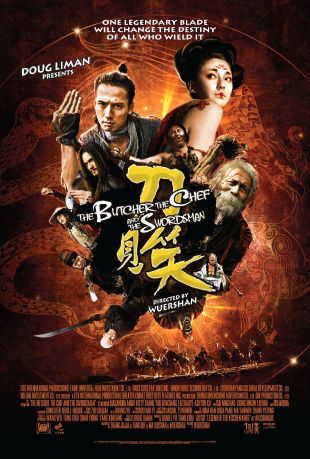First-time director Wuershan mixes influences ranging from Crouching Tiger, Hidden Dragon to Hero to Kung Fu Hustle to Kill Bill Vol. 1, and comes away with a mostly agreeable kung fu stew. However, the path to get there may cause some fits. It takes a good 20 minutes to get in step with Wuershan's choppy visual rhythms, and he begins The Butcher, the Chef, and the Swordsman by concentrating on the least interesting third of the story, which features a classically defined "fool" character with highly grating mannerisms. To Wuershan's credit, by the time the last tale has finished unfolding, the director has gathered things together enough to produce a decent audience pleaser.
The Butcher, the Chef, and the Swordsman first introduces us to Chopper (Liu Xiaoye), a peasant butcher who falls in love one night after a blow to the head knocks him unconscious. He awakens to see the image of Madam Mei (Kitty Zhang Yuqi), a beautiful courtesan working in the local brothel. When he tries to meet her, though, the homely Chopper is laughed at by the other women and bullied by the local alpha male, Big Beard (Senggerenqin). Ejected from the brothel into the rainy night, Chopper is contemplating ending it all when he meets a bedraggled stranger carrying a very special cleaver, carved from rough black iron. The stranger tells Chopper the story of how the cleaver was used in a restaurant famous for an elaborate eight-course meal that only one chef (Mi Dan) knows how to prepare. Getting on in years, that chef takes on an apprentice (Masanobu Ando) to teach his secrets to, including the impossible eighth course, in which he guts and serves a fish before the fish knows it's dead. Unbeknownst to his chef, the mute apprentice has a vengeful agenda against a prospective customer, the warlord who killed his family (Xie Ning). The chef tells his apprentice the story of how he came into possession of the special cleaver, which was forged by the great swordsmith Fat Tang (You Benchang). Fat Tang was approached by Dugu Cheng (Ashton Xu), who wanted to be the greatest swordsman in the world, which inspired him to dig up a block of iron that had been buried with his father, himself a world-renowned warrior. That iron had been melted down from the swords of all the great swordsmen his father defeated, meaning any sword created from it would be the greatest sword ever made. However, since the swordsman's father melted the swords as a gesture of nonviolence, the fates may be against Cheng's violent ambitions.
Wuershan is clearly interested in bringing the ancient storytelling traditions of his Chinese homeland into the modern age. While structuring his tale in a way that pays homage to that oral tradition, he also uses modern storytelling methods to speak to a contemporary audience. For example, one killing is dissected (pun intended) through the technique of showing it again on replay, like a sporting event. At another point, two warriors duel in the aesthetic of a *Mortal Kombat-style video game. When Chopper is turned away by the cruel women of the brothel, it's fashioned after a hip-hop music video. Not all of these gimmicks work, and they are applied inconsistently. A more traditional cutaway that works better is an animated sequence evoking ancient Chinese art, in which the chef's apprentice describes the slaughtering of his family at the hands of the evil warlord. This serves the same function and is about as effective as the similar scene in Quentin Tarantino's Kill Bill Vol. 1.
Of the three stories, the chef's is by far the most satisfying and visually delightful. The visuals benefit greatly from the preparation of the scrumptious-looking eight-course meal, its colorful vegetables and meats bursting off the screen, enhanced by Wuershan's quick edits and compelling use of split screen. This segment also has the best narrative structure, with a clear beginning, middle, and end. The swordsman's story is interesting but all too brief, while the butcher's story has the opposite problem, going on too long, and introducing elements near the end that don't spring organically from the beginning. Not to mention that it features the clownish, over-the-top performance from Liu Xiaoye as Chopper.
Buoyed by the crossover potential of executive producer Doug Liman, The Butcher, the Chef, and the Swordsman seems poised to introduce the world to a new talent emerging from the Hong Kong scene. It may take until Wuershan's second or third film, though, before he assembles his perfect meal, without any sour spots.
